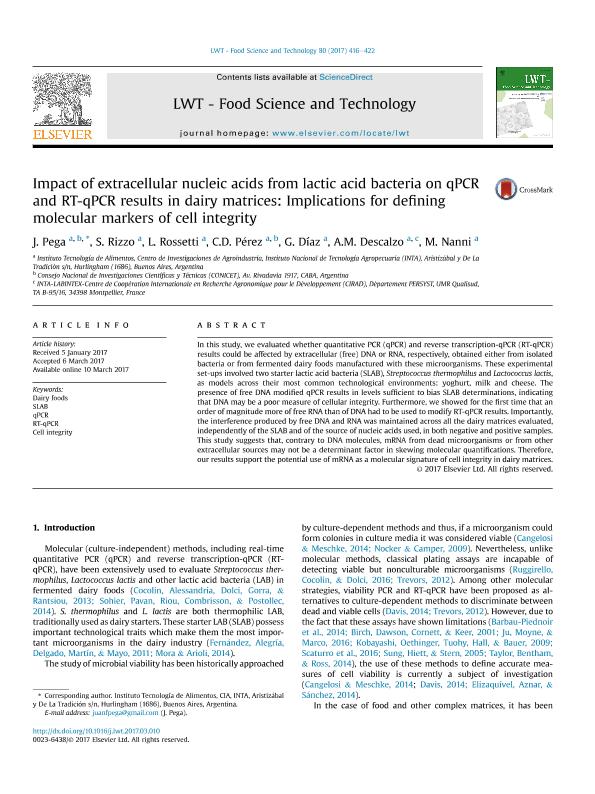Artículo
Impact of extracellular nucleic acids from lactic acid bacteria on qPCR and RT-qPCR results in dairy matrices: Implications for defining molecular markers of cell integrity
Pega, Juan Franco ; Rizzo, Sergio Anibal; Rossetti, Luciana; Pérez, Carolina Daiana
; Rizzo, Sergio Anibal; Rossetti, Luciana; Pérez, Carolina Daiana ; Díaz, G.; Descalzo, Adriana Maria; Nanni, Mariana Sandra
; Díaz, G.; Descalzo, Adriana Maria; Nanni, Mariana Sandra
 ; Rizzo, Sergio Anibal; Rossetti, Luciana; Pérez, Carolina Daiana
; Rizzo, Sergio Anibal; Rossetti, Luciana; Pérez, Carolina Daiana ; Díaz, G.; Descalzo, Adriana Maria; Nanni, Mariana Sandra
; Díaz, G.; Descalzo, Adriana Maria; Nanni, Mariana Sandra
Fecha de publicación:
07/2017
Editorial:
Elsevier Science
Revista:
LWT - Food Science and Technology
ISSN:
0023-6438
Idioma:
Inglés
Tipo de recurso:
Artículo publicado
Clasificación temática:
Resumen
In this study, we evaluated whether quantitative PCR (qPCR) and reverse transcription-qPCR (RT-qPCR) results could be affected by extracellular (free) DNA or RNA, respectively, obtained either from isolated bacteria or from fermented dairy foods manufactured with these microorganisms. These experimental set-ups involved two starter lactic acid bacteria (SLAB), Streptococcus thermophilus and Lactococcus lactis, as models across their most common technological environments: yoghurt, milk and cheese. The presence of free DNA modified qPCR results in levels sufficient to bias SLAB determinations, indicating that DNA may be a poor measure of cellular integrity. Furthermore, we showed for the first time that an order of magnitude more of free RNA than of DNA had to be used to modify RT-qPCR results. Importantly, the interference produced by free DNA and RNA was maintained across all the dairy matrices evaluated, independently of the SLAB and of the source of nucleic acids used, in both negative and positive samples. This study suggests that, contrary to DNA molecules, mRNA from dead microorganisms or from other extracellular sources may not be a determinant factor in skewing molecular quantifications. Therefore, our results support the potential use of mRNA as a molecular signature of cell integrity in dairy matrices.
Palabras clave:
Cell Integrity
,
Dairy Foods
,
Qpcr
,
Rt-Qpcr
,
Slab
Archivos asociados
Licencia
Identificadores
Colecciones
Articulos(SEDE CENTRAL)
Articulos de SEDE CENTRAL
Articulos de SEDE CENTRAL
Citación
Pega, Juan Franco; Rizzo, Sergio Anibal; Rossetti, Luciana; Pérez, Carolina Daiana; Díaz, G.; et al.; Impact of extracellular nucleic acids from lactic acid bacteria on qPCR and RT-qPCR results in dairy matrices: Implications for defining molecular markers of cell integrity; Elsevier Science; LWT - Food Science and Technology; 80; 7-2017; 416-422
Compartir
Altmétricas



